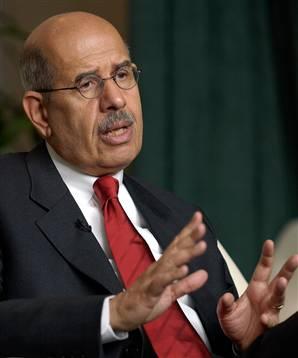 Mohammed ElBaradei, who angered the Bush administration by disputing its claims that Saddam Hussein's regime had an active nuclear weapons program, won the 2005 Nobel Peace Prize on Friday
Mohammed ElBaradei, who angered the Bush administration by disputing its claims that Saddam Hussein's regime had an active nuclear weapons program, won the 2005 Nobel Peace Prize on Friday “I think Mr. ElBaradei frankly is wrong.” - Dick Cheney
"We know where they are. They're in the area around Tikrit and Baghdad and east, west, south and north somewhat". - Donald Rumsfeld (Meet The Press, March 16, 2003):
MR. RUSSERT: And even though the International Atomic Energy Agency said he does not have a nuclear program, we disagree.
VICE PRES. CHENEY: I disagree, yes. And you’ll find the CIA, for example, and other key parts of our intelligence community, disagree. And we believe he has, in fact, reconstituted nuclear weapons. I think Mr. ElBaradei, frankly, is wrong. And I think if you look at the track record of the International Atomic Energy Agency and this kind of issue, especially where Iraq is concerned, they have consistently underestimated or missed what it was Saddam Hussein was doing. I don’t have any reason to believe they’re any more valid this time than they’ve been in the past. (End videotape)
(Meet The Press, September 14, 2003):
MR. RUSSERT: Reconstituted nuclear weapons. You misspoke.
VICE PRES. CHENEY: Yeah. I did misspeak. I said repeatedly during the show weapons capability. We never had any evidence that he had acquired a nuclear weapon.
The International Atomic Energy Agency and its chief Mohamed ElBaradei have won the 2005 Nobel Peace Prize for their efforts to stop the spread of nuclear weapons. The Egyptian-born ElBaradei has served as Director General of the IAEA since 1997. He won the prize just months after the United States tried to force him from his job after the Bush administration repeatedly clashed with him over Iraq and Iran. In February 2003 – a month before the U.S. invasion – ElBaradei told the United Nations that nuclear experts had found no weapons of mass destruction in Iraq. He said “We have to date found no evidence of ongoing prohibited nuclear or nuclear-related activities in Iraq.” John Bolton – who is now the US ambassador to the United Nations – responded by saying this is “impossible to believe.” Vice President Dick Cheney said “I think Mr. ElBaradei frankly is wrong.” But it turned out ElBaradei was correct. He was also correct when he publicly cast doubt on President Bush's claim that Iraq was purchasing tons of enriched uranium from Niger for a nuclear weapons program. Days before the U.S. invasion, ElBaradei revealed that the U.S. had relied on fabricated documents to come to that conclusion. Now the U.S. and ElBaradei are at odds again. This time it is over Iran. ElBaradei says the IAEA has no evidence that Iran has a nuclear weapons program. But the Bush administration rejects this view and went so far as to spy on him in an attempt try to block his re-election. Last year the Washington Post revealed that the U.S. listened in on dozens of phone calls between ElBaradei and Iranian diplomats in search of ammunition to use against him. When his re-election was initially put for a vote, 34 nations agreed to keep him as head of the IAEA and only the U.S. expressed opposition. ElBaradei has also called on Israel to disarm its secret nuclear weapons program and called for a nuclear-free Middle East. Last year in an interview with the New York Times he warned “"If the world does not change course, we risk self-destruction.”

We should have listened...We should have given Elbaradei and Han Blix the 'few more months'... "These few months would be a valuable investment in peace because they could help us avoid a war". Elbaradei before we invaded Iraq
Statement to the United Nations Security Council New York 27 January 2003 CONCLUSION To conclude: we have to date found no evidence that Iraq has revived its nuclear weapons programme since the elimination of the programme in the 1990s. However, our work is steadily progressing and should be allowed to run its natural course. With our verification system now in place, barring exceptional circumstances, and provided there is sustained proactive cooperation by Iraq, we should be able within the next few months to provide credible assurance that Iraq has no nuclear weapons programme. These few months would be a valuable investment in peace because they could help us avoid a war. We trust that we will continue to have your support as we make every effort to verify Iraq’s nuclear disarmament through peaceful means, and to demonstrate that the inspection process can and does work, as a central feature of the international nuclear arms control regime.









